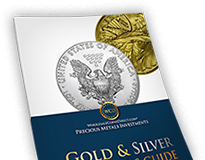
What Are Certified Coins? | Certified Coin Value & Worth
Ever wonder how a simple piece of metal can tell centuries of stories, seal deals, and even build fortunes? Around the 5th or 6th century BCE, coins took the stage as a method of payment. Used as a medium of business, coins have been a vital part of human history since the start of civilization.
But over time, they have become collectible items and a means of investment. One of the most crucial aspects of coin investing is the certification process. Certified coins are authentic and valuable in the numismatic market.
Below is a guide that explores everything you need to know about certified coins.
What Are Certified Coins?
Certified coins are coins that have undergone authentication and grading by a third party. It involves services such as the Professional Coin Grading Service (PCGS).
These services rigorously examine each coin, assessing its condition, authenticity, and quality. The process offers a standardized evaluation, giving you confidence in the coin's value.
The Process of Coin Certification
As a coin collector or investor, understanding coin certification is beneficial. The process can help you assess, authenticate, and protect your coins. Here are the key steps for coin certification.
Grading
Coin grading serves as the foundation of the certification process. It is like determining a coin's DNA. Numismatic experts will scrutinize every aspect of a coin -- from its surface to its edges.
They'll assess factors such as:
Wear
Luster
Strike quality
Surface preservation
After evaluation, they will assign the coin its numerical grade on the Sheldon scale. The scale ranges from 1 to 70, with higher grades indicating superior condition. A coin with minimal wear, crisp details, and vibrant luster will likely receive a higher grade.
Grading provides you with a standardized language to communicate a coin's quality accurately. A coin's grade hugely influences its resale value. If you have higher-graded coins, they can command premiums in the market.
Authentication
Once a coin undergoes grading, the next step is authentication. Authentication is the process of verifying your coin's legitimacy. With the rise of counterfeit coins in the market, authentication of coins is a must.
Authentication can involve visual examination or advanced scientific techniques. Although visual inspection is fundamental, it may not detect sophisticated counterfeits. This is where advanced methods like X-ray fluorescence (XRF) spectroscopy come in.
XRF can analyze the elemental composition of a coin, revealing inconsistencies. A certified coin provides peace of mind, allowing you to invest in genuine pieces.
Authentication stops the circulation of counterfeit coins. This helps preserve the integrity of the numismatic market.
Encapsulation
The final step in the coin certification process is encapsulation. It involves sealing a coin in a tamper-proof holder made of inert materials such as plastic. These materials ensure that they don't react with the coin over time.
Encapsulation helps provide physical protection to your coin. It offers protection against:
Scratches
Mishandling
Tampering
Environmental hazards such as corrosion or oxidation
As a result, your coin can maintain its pristine state for generations to come. Additionally, encapsulation enhances the presentation of your certified coins. This helps elevate their aesthetic appeal and collectible value.
Differences Between Certified Coins vs. Uncertified Coins
The debate between certified coins and uncertified coins often confuses collectors and investors. To help you make the right investment choice, let's explore the differences between the two.
Certification Process
Certified coins undergo a meticulous authentication and grading process. This is usually done by third-party grading services such as the PCGS or NGC. During certification, numismatic experts will grade and assess the authenticity of your coins.
On the other hand, uncertified coins lack formal authentication and grading. Their authenticity and grade rely solely on the expertise of the buyer or seller. This can lead to discrepancies and uncertainties with their value and quality.
Assurance of Authenticity
Certified coins have the assurance of authenticity provided by reputable grading services. Since each coin has a unique certification number, you can be sure of the coin's legitimacy.
Conversely, uncertified coins present a higher risk in terms of authenticity. Without official certification, you may have to rely on your knowledge and expertise. This can lead to potential fraud or overpaying for a coin.
Grading Standards
Certified coins adhere to strict grading standards established by reputable grading services. These standards categorize coins based on their condition, including:
- Mint State (MS) for Uncirculated Coins: Shows pristine condition
- About Uncirculated (AU) Grade: Shows minimal wear, often with traces of luster
- Very Fine (VF) Grade: Shows moderate wear but with design details still sharp
These standards ensure consistency and accuracy in assessing the condition and value of coins. On the other hand, grading uncertified coins can be subjective. The absence of standardized grading criteria may result in inconsistencies, reducing coin value.
Market Acceptance and Liquidity
Certified coins enjoy broader market acceptance and liquidity. This is due to their authenticated status and standardized grading. Buyers and sellers can confidently trade certified coins based on their recognized grades, enhancing their marketability.
Uncertified coins aren't liquid due to a lack of authenticity and grading. As a result, most collectors tend to be hesitant to transact.
Price Transparency and Value
Certified coins often exhibit more stable pricing trends compared to uncertified coins. Their prices are often readily available through online platforms or numismatic publications. This facilitates informed decision-making for both buyers and sellers.
Determining the coin value of uncertified pieces can be opaque and more subjective. Pricing may vary based on factors such as perceived rarity of the coin. As a result, it may lead to uncertainty in transactions.
Preservation and Protection
Certified coins are encapsulated in durable holders. They protect them from environmental damage, tampering, and handling. These holders also provide a convenient means of display and storage for collectors.
Without the encapsulation, uncertified coins are more vulnerable to damage over time. This increases the risk of deterioration.
Secondary Market Accessibility
Certified coins offer greater accessibility to the secondary market. This is because they're readily identifiable and trusted by collectors, and investors. The accessibility facilitates buying, selling, and trading certified coins with confidence and efficiency.
The accessibility of uncertified coins on the secondary market is often limited. This is due to the lack of authentication and evaluation. It makes it challenging to establish credibility in secondary market transactions.
Why Buy Certified Coins?
As a coin collector, you know that collecting coins is not just about acquiring many pieces. It is about finding valuable coins. Here are some benefits of buying certified coins.
Guaranteed Authenticity
One benefit of buying certified coins is the guarantee of authenticity. Certified coins are graded and authenticated by reputable third-party grading services.
When you buy certified coins, you can be confident that you're getting what you pay for. You won't have to worry about buying a counterfeit or altered coin.
Consistent Grading Standards
Certified coins are graded according to a widely accepted grading standard. This means that when you buy a certified coin, you know you're getting good condition and quality. With this grading system, you can compare coins of the same type and denomination easily.
Protection and Preservation
Certified coins undergo encapsulation in a tamper-evident plastic holder. This protects the coin from damage and wear, preserving its condition and value. The holder also includes a label that contains information about the coin, such as its:
Type
Date
Grade
Denomination
This label provides a permanent record of the coin's condition and authenticity. It can help you when you're buying or selling certified coins.
Increased Resale Value
Certified coins are more valuable than non-certified coins. This is because they come with a guarantee of authenticity and a consistent grading. When you're ready to sell your certified coins, you can expect to get a higher price.
Access to a Wider Market
Certified coins are more widely accepted in the coin market than non-certified coins. This means that you'll have access to a wider market when you buy and sell certified coins.
You can find these coins at auctions, coin shows, and online marketplaces. If you are a seller, you can get access to a larger pool of potential buyers. This makes the sale easier and more profitable.
Easy Liquidity and Market Acceptability
Certified coins enjoy greater market acceptance and liquidity than uncertified coins. Their verified authenticity and grading make them more desirable. This facilitates smoother transactions, ensuring a more active market for trading and collecting.
Accessibility to a Diverse Range of Coins
Investing in certified coins gives you accessibility to a diverse range of coins. Grading services evaluate coins from various eras, regions, and denominations. This offers collectors and investors with a vast array of options to choose from.
You can have access to ancient Roman coins or gold bullion. This diversity helps enrich your collection. It also presents opportunities for diversification and portfolio growth.
Educational Value
Collecting certified coins can also be an educational experience. When you buy certified coins, you're not just acquiring a valuable piece of metal. You also learn about the history, culture, and artistry of the coin.
Certified coins often come with detailed information about their design, production, and significance. This can help you to develop a deeper understanding of the coin and its history.
Aesthetic Appeal
Certified coins are often more visually appealing than non-certified coins. The holders used to encapsulate certified coins showcase the coin's design with artistry. These coins can be a source of pride and enjoyment, even if you never sell them.
Factors to Consider When Investing in Certified Coins
Investing in certified coins can be rewarding. However, navigating the numismatic market requires careful consideration. Here are key factors to consider when investing in certified coins.
Metal Content
The metal content of a coin plays a huge role in its investment potential. Most precious metals such as gold and silver are highly sought after for their value. These metals can also hedge against economic uncertainties.
When evaluating certified coins, consider the purity and weight of the metal. Coins with higher purity levels will command higher premiums. They may also offer greater long-term value retention.
Numismatic Value
Certified coins often have numismatic value. This stems from factors such as rarity, historical significance, and condition. Numismatic coins undergo grading on a scale from poor to perfect.
As an investor, ensure you assess the numismatic value of a coin based on its grade and mintage numbers. Always opt for coins with higher grades since they're rare and in better condition.
Coin Demand
The demand for a certified coin can influence its marketability and resale value. Coins with popular designs or cultural significance are often more desirable among investors.
Additionally, coins issued by reputable mints may command higher premiums. This is due to their scarcity and collector appeal.
Ensure you research current market trends and collector preferences. This will help you identify coins with strong demand.
Coin Toning or Tarnishing
When evaluating a certified coin for investment, examine its toning or tarnishing condition. Coins with attractive, natural toning may command higher premiums among certain collectors. However, coins with excessive tarnishing or artificial toning may experience depreciation.
Generation of the Holder
If you want to buy a certified coin, take into account the generation of the holder. Coins housed in newer-generation holders may offer greater peace of mind. This is because they offer good coin preservation and condition.
Reputation of Dealers
Dealing with reputable and trustworthy dealers is paramount when investing in certified coins. A reputable dealer will guarantee the authenticity of the coins. They will also provide transparent pricing.
Look for dealers with established reputations and positive reviews. Also, opt for dealers with membership in professional numismatic organizations. Avoid dealing with unverified sellers to reduce the risk of buying counterfeit coins.
Elevate Your Portfolio With Certified Coins
Certified coins are a representation of numismatic excellence. Through rigorous authentication and grading processes, these coins offer value and historical appeal. This makes them a great addition to your investment portfolio.
Ready to explore the world of precious metals investing further? Get our free precious metals investor guide here or reach out to us by calling (866) 855-3911 to secure your financial future.











